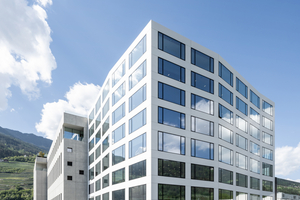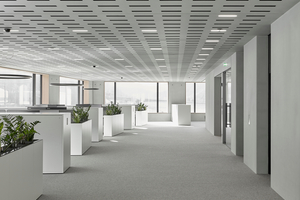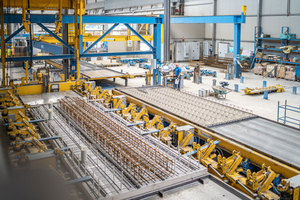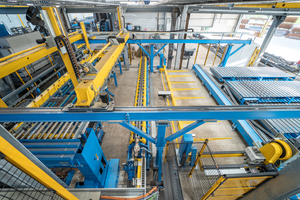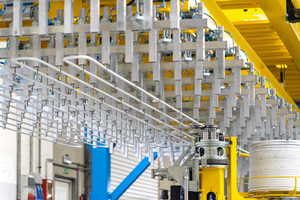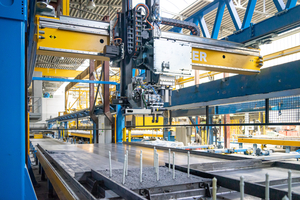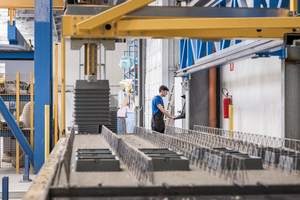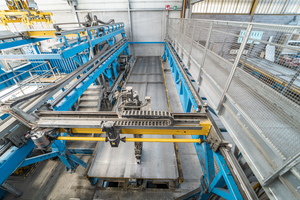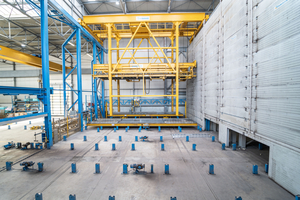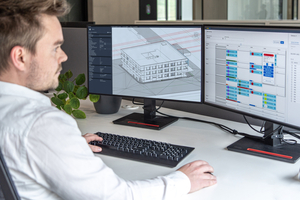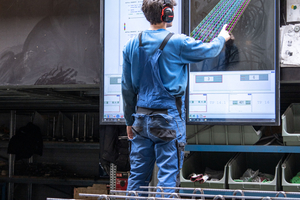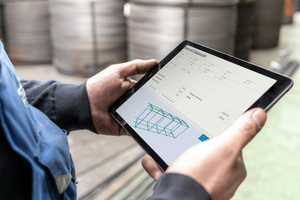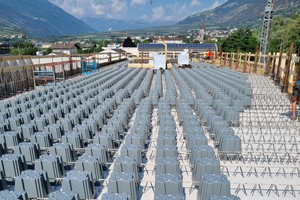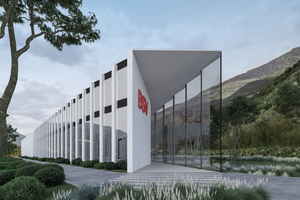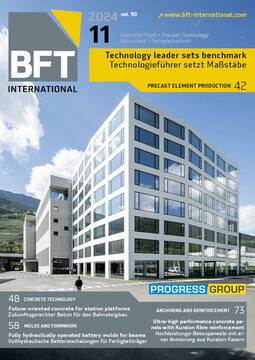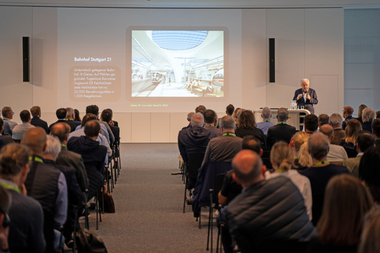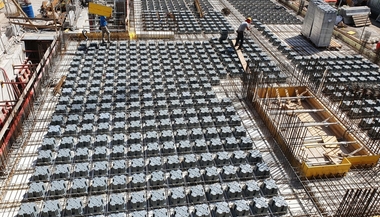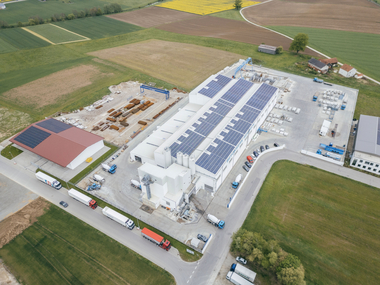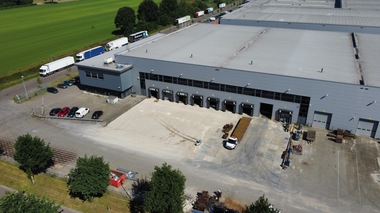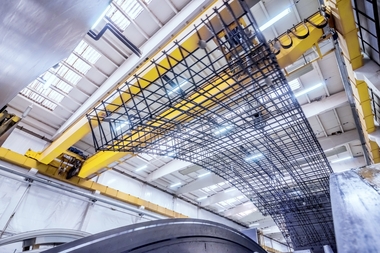Technology leader sets benchmark with own precast plant
Progress Group is primarily known as a full-service provider of complete automation solutions in reinforcement and precast element production, as well as of the associated software. What many people are not aware of is the fact that the international group operates its own state-of-the-art precast plant with integrated rebar shop at its headquarters in Brixen.
Over 30 years of in-house production
The first pallet carousel line was put into service in Brixen in the early 1990s. Prior to this expansion, precast floor slabs had already been produced on casting beds. A second carousel line for producing double walls and floor slabs followed in 1998. The first line underwent a complete overhaul in 2011.
The individual machines included in the production line generally have an exceedingly long service life. However, the Progress precast plant is constantly being modernized and expanded because the company sees itself not only as a producer, but also as its very own “innovation hub.” New developments from the group’s mechanical engineering and software departments are deployed in response to market demand.
Automation ensures employee satisfaction
One example of continuously evolving automation is the Form Master shuttering, demolding and storage robot, which eliminates strenuous manual shuttering work and makes workplaces more attractive and safer. Testimony to this is the fact that several shop-floor staff members have been with the company for almost 40 years while being able to continuously develop their scope of work. Automation thus creates new prospects and attracts young people to the business by providing safe yet exciting tasks.
All innovations under a single roof
Progress Group’s equipment does not only include conventional reinforcement machines, such as a Wire Center that optimally supports the production process through the automated processing of reinforcing steel from the coil and the installation of reinforcement according to CAD specifications, the Blue Versa lattice girder welding unit, the EBA automatic stirrup bending machines, and the MSR multi-rotor straightening and bending machines. It also features absolute world-firsts in the bending shop and the precast plant. The M-System Smart Mesh mesh welding machine with integrated bending system, for example, can automatically produce extra-wide mesh and process it into a complete reinforcement cage. The Tube Master is a new type of tube-laying robot that automatically bends heating and cooling tubes to produce thermally activated, energy-efficient precast elements and places them on the pallet with a high degree of precision. This setup increases productivity and makes work easier. Other modernized machines integrated into the carousel system include the Econ Drive automated concrete spreader, which ensures significant material savings and high concrete quality, as well as two combined shaking and vibration units.
In addition, two compelling innovations were installed at the precast plant in 2023 to allow for the efficient, automated production of licensed precast concrete components, i.e., the Green Code thermal wall and the Green Code Eco Slab: The Pin Master automatically inserts the so-called GC pins – connectors to interlink the thermal wall’s inner and outer panels without thermal bridging – into the insulating material of the thermal wall and thus eliminates the need for insertion by hand. The Box Master installs the GC base (the lower part of the Green Code Eco Slab recess body) automatically on the shop floor, ensuring pinpoint precision while avoiding manual work.
Software is the key to efficiency
The precast plant already uses Progress software solutions – from the initial planning stages to actual production. The BIMpro software, which converts architectural models into precast element models in a quick and effortless process, supports the design of the elements and achieves time savings of up to 50%. The model-based data is simply exported for planning and production as PXML data and sent to the other systems. The entire planning process takes place within the Erpbos solution provided by Progress, which maps the complete business process specifically for the precast industry, involving all steps from sales to invoicing.
Industry-specific Progress MES systems control and monitor production. The Profit control system manages and monitors all production processes and machines in reinforcing steel processing to ensure maximum accuracy and efficiency at the in-house rebar shop. Its counterpart Ebos controls both precast production cycles while ensuring quality thanks to the associated features. One related example is the Green Code Curing Control, which monitors the curing process and uses smart sensors to send data in real time. This process captures exactly when the elements are ready for demolding.
This fully digitalized production setup implements an end-to-end process including planning and design, production, and assembly. Efficiency and productivity increase significantly, and machine availability rises by up to 15%.
Sustainable recess body reduces the amount of required reinforcement
Progress AG is one of the founding members of Green Code, a licensed building system for sustainable, innovative precast elements. The Green Code system enables the construction of modern, customized buildings conforming to a high quality standard. These innovative precast elements optimize material consumption while reducing environmental impact to a minimum. The latest achievement of this system is the Green Code Eco Slab, which can be produced automatically at the Progress AG premises using the Box Master. The Green Code Eco Slab makes it possible to dispense with some of the steel reinforcement and replace it with an environmentally friendly recess body – without compromising on structural performance. This recess body referred to as the GC box saves not only steel but also concrete in the Green Code Eco Slab. More specifically, it saves up to 25% of concrete and dead weight of the slab as well as 15% of steel, thus reducing carbon emissions considerably. The GC box is made of 100% recycled polypropylene, which can be fully reused at the end of the building’s service life. It consists of a base (GC base) installed at the factory using the Box Master and a top (GC top) added on site.
Advantages of automation: precision and product safety
Plant manager Robert Wenter, who has been with the company for 25 years, believes that the benefits of automation lie not only in increased productivity, but – even more importantly – in quality: “Precision and product safety are essential in our field. It is of paramount importance that all prefabricated elements are produced exactly according to plan to ensure the structural integrity and stability of the building while minimizing sources of error.”
We are Progress – continuous progress
Progress Group’s future development also fully focuses on innovative and sustainable solutions, which are thoroughly tried and tested at the company’s own factory – in all three fields of the group’s business: mechanical engineering, software development, and precast production.
CONTACT
Progress Group
Julius-Durst-Strasse 100
39042 Brixen/Italy
+39 0472 979900
info@progress.group
https://www.progress.group/

